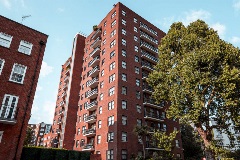
Friday, May 08, 2020| Published in The Lawyer's Daily
Even if eviction was possible in these COVID-19 times, it would be very hard for a landlord to evict a tenant both from an ethical and a practical standpoint. From an ethical perspective, we are all facing COVID-19 together and we have all been asked to sacrifice. So, evicting one of our fellow citizens in these desperate times is a difficult choice for a landlord.
From a practical standpoint, eviction would lead to a vacant unit that would be very difficult to fill with a replacement renter. The landlord would then have a unit that was not generating any revenue. The result would not place the landlord in a better financial position than it would have been if the non-paying tenant was not evicted.
The first option is to get the rental arrears paid back via repayment agreements. Landlords and tenants can make arrangements that allow tenants to pay back their rent arrears in small increments within a defined period of time.
What happens if tenant breaches repayment agreement?
If the tenant stops paying the incremental amounts, they are in breach of the repayment agreement. At this point, unless a new agreement is reached, the remedy for the landlord is eviction and enforcement of the agreement. Eviction is also the default remedy if the tenant cannot agree to any repayment plan at the outset.
If the tenant is still in possession of the unit, the landlord must file an application with the Landlord and Tenant Board (LTB) to obtain an order for eviction and repayment of arrears. The eviction order can be enforced by the sheriff if the tenant does not leave voluntarily. If the tenant does not pay the rent arrears voluntarily as per the LTB order, the landlord must enforce the order via small claims court. Here, enforcement can entail, among other options, garnishment of the tenant’s employment wages.
If the tenant is not in possession of the unit and no LTB application has been filed, then the LTB has no jurisdiction. So, the landlord must seek enforcement of the rent arrears through small claims court.
LTB backlog
In many jurisdictions, especially Toronto, the LTB was already very busy before the COVID-19 crisis. The LTB was rarely meeting its own standard of holding hearings within 25 business days of application. It met this standard in just 35 per cent of cases during 2018-19 (latest annual report), prompting the Ontario Ombudsman to announce, in December 2020, that he will be launching an investigation.
After the crisis is over, the LTB will not only have to address the existing backlog but will have to manage all the new applications related to matters arising during the crisis months. Without doubt, more resources are going to be needed to address the number of applications. The LTB will also need to look at other options for efficiently resolving cases. This may mean resolving matters through written submissions only, or through virtual hearings. The LTB will have to be careful here as reduction in oral hearings may raise access to justice issues.
Impact of eviction
Even if the LTB situation is resolved, there still remains the same issue as discussed above — ethical and practical implications of evictions. Here, the question is whether eviction is more palatable post-crisis?
Tenants who are evicted will find it hard to find alternative housing. As mentioned previously, the vacancy rate in Ontario is currently around two per cent and if the number stays the same post-crisis, there will be few units available. This is especially true as construction of new housing has slowed down during the crisis.
Furthermore, although there is no central database to identify tenants that have been evicted, most sophisticated landlords require a reference from a tenant’s previous landlord as a condition for tenancy — another challenge for renters seeking to be rehoused. Additionally, failure to pay rent at a previous address or excessive reliance on credit which is also unpaid may result in a poor rental reference on new applications to rent. A job loss that resulted in the failure to pay rent in the first place likely will mean a lack of savings to afford the first and last months’ rent at a new place, even if a new job is obtained.
It should also be pointed out that pursuing eviction is not ideal situation for landlords either, as there are financial costs associated with:
Moreover, landlords will have to weigh whether or not it is financially feasible for them to pursue collection of rent arrears from former tenants, as there is a cost (time and money) associated with such collection. Some landlords will likely choose to write off these costs.
This is part three of a five part series. Part one: Tenant-landlord tango: Implications of COVID-19 on residential rent arrears. Part two: Rent arrears during COVID-19: What landlords, tenants ought to know.
Even if eviction was possible in these COVID-19 times, it would be very hard for a landlord to evict a tenant both from an ethical and a practical standpoint. From an ethical perspective, we are all facing COVID-19 together and we have all been asked to sacrifice. So, evicting one of our fellow citizens in these desperate times is a difficult choice for a landlord.
From a practical standpoint, eviction would lead to a vacant unit that would be very difficult to fill with a replacement renter. The landlord would then have a unit that was not generating any revenue. The result would not place the landlord in a better financial position than it would have been if the non-paying tenant was not evicted.
The first option is to get the rental arrears paid back via repayment agreements. Landlords and tenants can make arrangements that allow tenants to pay back their rent arrears in small increments within a defined period of time.
What happens if tenant breaches repayment agreement?
If the tenant stops paying the incremental amounts, they are in breach of the repayment agreement. At this point, unless a new agreement is reached, the remedy for the landlord is eviction and enforcement of the agreement. Eviction is also the default remedy if the tenant cannot agree to any repayment plan at the outset.
If the tenant is still in possession of the unit, the landlord must file an application with the Landlord and Tenant Board (LTB) to obtain an order for eviction and repayment of arrears. The eviction order can be enforced by the sheriff if the tenant does not leave voluntarily. If the tenant does not pay the rent arrears voluntarily as per the LTB order, the landlord must enforce the order via small claims court. Here, enforcement can entail, among other options, garnishment of the tenant’s employment wages.
If the tenant is not in possession of the unit and no LTB application has been filed, then the LTB has no jurisdiction. So, the landlord must seek enforcement of the rent arrears through small claims court.
LTB backlog
In many jurisdictions, especially Toronto, the LTB was already very busy before the COVID-19 crisis. The LTB was rarely meeting its own standard of holding hearings within 25 business days of application. It met this standard in just 35 per cent of cases during 2018-19 (latest annual report), prompting the Ontario Ombudsman to announce, in December 2020, that he will be launching an investigation.
After the crisis is over, the LTB will not only have to address the existing backlog but will have to manage all the new applications related to matters arising during the crisis months. Without doubt, more resources are going to be needed to address the number of applications. The LTB will also need to look at other options for efficiently resolving cases. This may mean resolving matters through written submissions only, or through virtual hearings. The LTB will have to be careful here as reduction in oral hearings may raise access to justice issues.
Impact of eviction
Even if the LTB situation is resolved, there still remains the same issue as discussed above — ethical and practical implications of evictions. Here, the question is whether eviction is more palatable post-crisis?
Tenants who are evicted will find it hard to find alternative housing. As mentioned previously, the vacancy rate in Ontario is currently around two per cent and if the number stays the same post-crisis, there will be few units available. This is especially true as construction of new housing has slowed down during the crisis.
Furthermore, although there is no central database to identify tenants that have been evicted, most sophisticated landlords require a reference from a tenant’s previous landlord as a condition for tenancy — another challenge for renters seeking to be rehoused. Additionally, failure to pay rent at a previous address or excessive reliance on credit which is also unpaid may result in a poor rental reference on new applications to rent. A job loss that resulted in the failure to pay rent in the first place likely will mean a lack of savings to afford the first and last months’ rent at a new place, even if a new job is obtained.
It should also be pointed out that pursuing eviction is not ideal situation for landlords either, as there are financial costs associated with:
- Legal fees for representation, application and enforcement;
- Cleaning/painting the unit after the renter has vacated;
- Finding a new renter; and
- Lost revenues while the unit is unoccupied.
Moreover, landlords will have to weigh whether or not it is financially feasible for them to pursue collection of rent arrears from former tenants, as there is a cost (time and money) associated with such collection. Some landlords will likely choose to write off these costs.
This is part three of a five part series. Part one: Tenant-landlord tango: Implications of COVID-19 on residential rent arrears. Part two: Rent arrears during COVID-19: What landlords, tenants ought to know.






